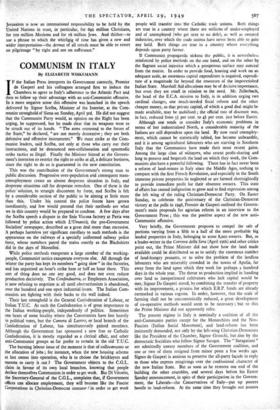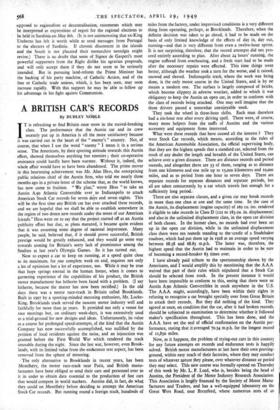COMMUNISM IN ITALY
By ELIZABETH WISKEMANN
IF the Italian Press interprets its Government correctly, Premier de Gasperi and his colleagues arranged first to induce the Chambers to agree to Italy's adherence to the Atlantic Pact and then to follow up their advantage with an anti-Communist offensive. In a more negative sense this offensive was launched in the speech delivered by Signor Scelba, Minister of the Interior, at the Com- munist stronghold of Siena on Sunday, April 3rd. He did not suggest that the Communist Party would, as opinion on the Right has been urging, be suppressed, but he made clear that its weapons were to be struck out of its hands. " The arms entrusted to the forces of the State," he declared, " are not merely decorative ; they are both defensive and offensive instruments." We must strike at the Com- munist leaders, said Scelba, not only at those who carry out their instructions, and he denounced non-collaboration and spasmodic strike tactics as illegal. Finally the Minister hinted at the Govern- ment's intention to restrict the right to strike at all, a delicate business, since the right to do so is guaranteed in the new constitution.
This was the contribution of the Government's strong man to public discussion. Progressive over-population and consequent mass- unemployment create an almost desperate situation in Italy, and desperate situations call for desperate remedies. One of these is the police' solution, to strangle discontent by force, and Scelba is felt by a considerable section of the public to be aiming at little more than this. Under his control the police forces have grown inordinately, and few would pretend that their methods are what we in this country would be prepared to condone. A few days after the Scelba speech a dispute in the Snia Viscosa factory at Pavia was followed by police action which L'Umanita, the pro-Government Socialists' newspaper, described as a great deal more than excessive. A perhaps harmless yet significant corollary to such methods is the appearance on the railways of a specially uniformed railway police force, whose members patrol the trains exactly as the Blackshirts did in the days of Mussolini.
While police methods exasperate a large number of the working- people, Communisf tactics exasperate everyone else. All through the winter the party has kept its members " going slow " in the factories, and has organised an hour's strike here or half an hour there. This sort of thing does no one any good, and does not even reduce production decisively. The Confindustria, or Employers Association, is now refusing to negotiate at all until obstructionism is abandoned, over the hundred and one open industrial issues. The Italian Com- munists are fighting with their backs to the wall indeed.
Their last stronghold is the General Confederation of Labour, or Italian T.U.C. As such the Confederation is of great importance to the Italian working-people, independently of politics. Sometimes one hears of some locality where the Communists have lost heavily in political votes, but the Camera di Lavoro, or local branch of the Confederation of Labour, has simultaneously gained members. Although the Government has sponsored a new free or Catholic Confederation, it is mostly regarded as a clerical affair, and other anti-Communist groups so far prefer to remain in the old T.U.C.
The burning labour issue of the moment is that of collocamento or the allocation of jobs ; for instance, when the new housing scheme at last comes into operation, who is to choose the bricklayers and masons to carry it out ? The Government objects to the C.G.L. claim in favour of its own local branches, knowing that people declare themselves Communists in order to get work. But Di Vittorio, the Secretary-General of the C.G.L., complains that, if Government offices can allocate employment, they will become like the Fascist Corporations in Christian-Democrat costume (in order to get work people will transfer into the Catholic trade unions. Both things are true in a country where there are millions of under-employed and of unemployed (who get next to no dole), as well as sweated industries, over which the trade unions have never been able to gain any hold. Both things are true in a country where everything depends upon party favour.
If Communist propaganda sickens the public, it is nevertheless reinforced by police methods on the one hand, and on the other by the flagrant social injustice which a prosperous surface may conceal from the tourist. In order to provide food, housing and work on an adequate scale, an enormous capital expenditure is required, expendi- ture of a magnitude far beyond the resources of the impoverished Italian State. Marshall Aid allocations may be of decisive importance, but even they arc small in relation to the need. Mr. Zellerbach, the head of the E.C.A. mission to Italy, is in addition urging two cardinal changes, one much-needed fiscal reform and the other cheaper money, so that private capital, of which a good deal might be made available, may be mobilised ; the official rate of discount was, in fact, reduced from 55 per cent. to 44 per cent. just before Easter.
Although one tends to consider Italy's economic problems in terms of her industrialised North, a considerable majority of the Italians are still dependent upon the land. By now rural unemploy- ment, which cannot be statistically tabled, has become unbearable, and it is among agricultural labourers who are starving in Southern Italy that the Communists have made their most recent gains. Among the large class of nietayers, who resent profit-sharing and long to possess and bequeath the land on which they work, the Com- munists also have a powerful following. There has in fact never been a reform of land-tenure in Italy since the Middle Ages, nothing to compare with the first French Revolution, and especially in the South immense private properties lie neglected or are farmed shortsightedly to provide immediate profit for their absentee owners. This state of affairs has caused indignation to grow and to find expression among the left wing of the ruling Christian-Democrat Party. On Easter Sunday, to celebrate the anniversary of the Christian-Democrat victory at the polls in 1948, Premier de Gasperi outlined the Govern- ment's main proposals for agrarian reform in an interview to the Government Press ; this was the positive aspect of the new anti- Communist offensive.
Very briefly, the Government proposes to compel the sale of portions varying from a fifth to a half of the more profitable big landed properties in Italy, belonging to some 8,000 owners. But, as a leader-writer in the Corriere della Sera (April 19th) and other critics point out, the Prime Minister did not show how the land made available could be distributed so as to satisfy the enormous number of land-hungry peasants, or to solve the problem of the landless labourers who are miserably crowded in the towns of Apulia, far away from the land upon which they work for perhaps a hundred days in the whole year. The threat to production implied in handing over land to inexperienced cultivators who lack capital would be met, Signor De Gasperi stated, by combining the transfer of property with its improvement, a process for which E.R.P. funds are already earmarked in various regions. In order, however, that the scale of farming shall not be uneconomically reduced, a great development of co-operative methods would seem to be necessary ; but to this the Prime Minister did not apparently refer.
The present regime in Italy is nominally a coalition of all the anti-Communist parties except for the Monarchists and the Neo- Fascists (Italian Social Movement), and land-reform has been insistently demanded, not only by the left-wing Christian-Democrats like the President of the Chamber, Signor Gronchi, but also by the democratic Socialists who follow Signor Saragat. The " Saragatiani " are admittedly uneasy members of the Government coalition, and one or two of them resigned from minor posts a few weeks ago. Signor de Gasperi is anxious to preserve the all-party facade in reply to those who express misgivings over the confessional character of the new Italian State. But as soon as he restores one end of the building the other crumbles, and several days before his Easter Sunday announcement, in spite of their participation in the Govern- ment, the Liberals—the Conservatives of Italy—put up posters hostile to land-reform. At the same time they brought out posters opposed to regionalism or decentralisation, statements which may be interpreted as expressions of regret for the regional elections to be held in Sardinia on May 8th. (It is not uninteresting that ex-King Umberto has felt it worth while to send messages from Portugal to the electors of Sardinia. If chronic discontent in the islands and the South is not placated their monarchist nostalgia might revive.) There is no doubt that some of Signor de Gasperi's most powerful supporters from the Right dislike his agrarian proposals, and will only accept them if they do not seem to be seriously intended. But in pursuing land-reform the Prime Minister has the backing of his party machine, of Catholic Action, and of the free or Catholic trade unions, which, it has been, seen, may soon increase rapidly. With this support he may be able to follow up his advantage in his fight against Communism.



































 Previous page
Previous page